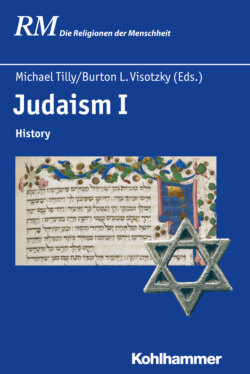Читать книгу Judaism I - Группа авторов - Страница 78
На сайте Литреса книга снята с продажи.
5 Roman Administration and the Run-up to the War
ОглавлениеThough Josephus places much of the blame for the war on Jewish extremists, he does not exempt the Romans, despite the fact that he was on the Roman payroll. Though a defender of Rome’s right to rule, and a champion of the Flavian dynasty and aristocratic Romanitas in general, Josephus identifies a group of »false Romans« analogous to his zealous »false Jews«: the procurators.13 In the second half of the first century, Josephus opines, Judea had the devastating misfortune of being ruled by crooks.
From 63 BCE, when Pompey set siege to Jerusalem marking an end to Judean political independence, the region had in one way or another been under Roman authority. Herod and Agrippa I as client kings had the widest freedoms and autonomy, but even these powerful Herodians served Rome. Rome applied a range of governing structures over the territories ruled by Herod’s offspring, from local tetrarchs to direct rule. After the death of Agrippa I in 44 CE, Rome seemed to lose interest in outsourcing control of the central parts of Judea to Jewish intermediaries: instead seven Roman procurators ruled between 44 and 66.14
In the run up to the war, Judea and environs fell under the aegis of the imperial province of Syria, whose capital was in Antioch. Imperial provinces were ruled de jure by the emperor, but de facto by a »legate,« of senatorial rank, someone from the highest circles of the Roman aristocracy and with a distinguished record of public service. Legates had legions under their command and reported directly to the emperor. Since Judea held a lower status, it was ruled by a procurator. This was an officer drawn from Rome’s equestrian class—wealthy Romans not among the highest aristocratic-senatorial families. The procurator had limited auxiliary forces under his control but no legions.
Under the best of circumstances, procuratorial rule in Judea faced structural challenges. Procurators served short terms, often only two years. This meant that office holders had little time or incentive to learn about the people under their rule, and often acted insensitively in the face of Jewish custom. One exception to this perhaps was the rule of Tiberias Julius Alexander, procurator from 46 to 48 CE. He was a Jew by birth, being a relative of the Alexandrian philosopher-statesman Philo of Alexandria. Josephus describes him as sensitive to Jewish mores and as a scourge of Jewish zealots (War 2.220; Ant. 20.100–102).
In addition to being prone to religious and cultural gaffes, Roman procurators were responsible for tax collection—never a popular way to ingratiate oneself with the people. Another challenge was that the troops at their disposal were but a handful of auxiliary units drawn mainly from non-Jewish local Syrian populations. This meant that local ethnic tensions often exaggerated what might have been simple law enforcement (War 2.268–69). Additionally, the number of auxiliary soldiers was inadequate to control the region. A pervasive sense of lawlessness spread across the land, with a range of effects. It demoralized the local populations and undoubtedly radicalized some. It emboldened political extremist groups, who could operate without check, and probably reinforced the sense that they were living in the end of days. Finally, the chaos of the era seems to have provoked a malignant culture of corruption.
Yet the chasm that opened between the procurators and the Jews was partly the fault of events set in motion earlier in the century. Herod, in an attempt to insulate himself from Jewish detractors among Hasmonean loyalists, dismantled and destabilized not only the Judean hierocracy but related institutions representing indigenous order, such as the Sanhedrin. The priestly establishment had been a vital buffer between imperial rule and the Jews for centuries. Direct Roman control continued the erosion of the social and economic elite of Judea. Their influence dwindled in the eyes of the ruling Romans and the disillusioned masses, with dire consequences.
The political situation in Judea was structurally friable and procuratorial intentions were far from noble. Even discounting Josephan exaggeration, the later procurators used their time in Judea to enrich themselves through a mixture of heavy taxation and graft. The economy was in shambles, the tax burden high, banditry was on the rise, as was apocalyptic rhetoric. »Terrorists« and »charlatans« says Josephus, »threatened with death anyone who kowtowed to the dictates of Roman rule.« To the point of class warfare, they fanned out over the country and »ransacked the estates of the powerful [and] murdered the owners« (War 2.264–65). Ignoring the input and plight of Judean elites, often manipulating and humiliating them, the Romans further diminished any cultural capital these moderates may have possessed, and pushed some even among them to radicalize. Yet Josephus did not blame Roman procurators alone for the deterioration of Judea’s politics. While corrupt Roman rule played a central role, certain Jews, he makes clear, were equally culpable for the region’s descent into violence.
